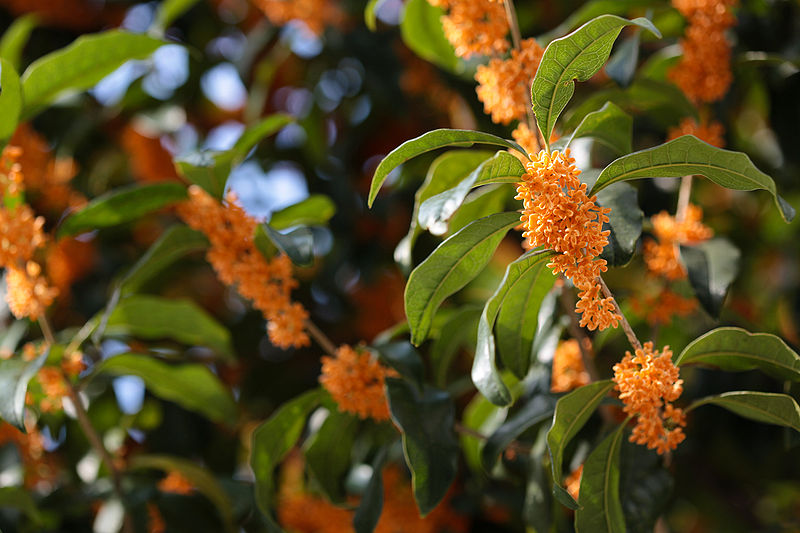
Author: Laitr Keiows via Wikipedia Commons Osmanthus fragrans tree, also called sweet or fragrant olive
Today’s blog post is taking us to China (中国 Zhōngguó, land of the middle), and to the meaning of some place names when their characters are translated literally.
北京 Beijing = northern capital
南京 Nánjīng = southern capital, having served as capital in the Ming and Qing dynasties, as well as of the Republic of China founded in 1912
上海 Shànghǎi = (city) at the sea
重庆 Chóngqìng = double celebration
福建 Fújiàn = the blessed establishment, the foundation of good fortune
青海 Qīnghǎi = the blue-green sea, named for Lake Qinghai
河北 Héběi = north of the river, referring to its location north of the Yellow River or 黄河 Huáng Hé
湖南 Húnán = south of the lake, referring to its location south of Lake Dongting or 洞庭湖 Dòngtíng Hú
湖北 Húběi = north of the lake, referring to Lake Dongting or 洞庭湖 Dòngtíng Hú
河南 Hénán = south of the river, referring to its location south of the Yellow River or 黄河 Huáng Hé
桂林 Guìlín = forest of fragrant olive (Osmanthus fragrans)
杭州 Hángzhōu = capital of the Hang province
苏州 Sūzhōu = “the province that is awake”; the character for Su 苏 in its name is a contraction that actually refers to nearby Mount Gusu 姑蘇山 Gūsūshān; the su refers to the mint Perilla frutescens, also known as shiso
四川 Sichuan = four rivers; the name of the province is an abbreviation of Sì Chuānlù (四川路), or “Four circuits of rivers”, which is itself abbreviated from Chuānxiá Sìlù (川峡四路), or “Four circuits of rivers and gorges”
贵州 Guìzhōu = the precious or noble province
山西 Shānxī = west of the mountains, refering to its location west of the Taihang Mountains or 太行山 Tàiháng Shān
安徽 Ānhuī = the quiet or safe emblem, actually named for two cities in southern Anhui, Anqing and Huizhou
云南 Yúnnán = “the region south of the clouds”, is actually named for the 云岭 Yúnlǐng or “Cloudy Peaks” mountains, which run north and south of Yunnan
香港 Xiānggǎng or Hong Kong = Fragrant Harbour
九龍 Kowloon/Gau2 Lung 4 in Cantonese= Nine dragons
澳门 Àomén, better known as Macao = the Bay Gate
广东 Guǎngdōng / Gwong2 Dung1 in Cantonese; Canton province = the wide East
台北 Táiběi = North of Taiwan

XIANGGANG has always been my favorite place name in China, especially given what I’ve heard of the quality of the air. 🙂 I was in Dalian (大连) this summer, the origin of which name nobody is quite sure. One of the best explanations I’ve heard is that it refers to the head of the chicken–if you look at China as a chicken, Dalian is right at the head!
interesting theory about the chicken head 🙂 – haven’t heard about that before! Literally, Dalian means the Great Connection obviously, maybe because the city merged with another neighboring city (according to Wikipedia…). My favorite Chinese place name is 福建 Fújiàn, because of the character for ‘happy’ 🙂 – must be nice to live in a ‘happy’ place!
The Fu is my favorite, too! 福 It means so much more than we give it credit for as simply “Lucky.”
totally agree with that 🙂 !